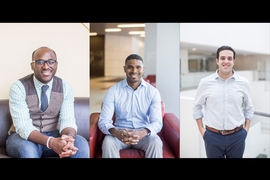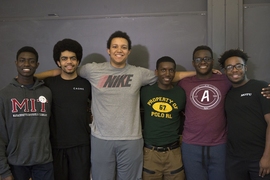On a crisp weekend in mid-October, 24 ambitious undergraduates from across the country arrived on the MIT campus for a program pitching the benefits of a graduate education in chemistry, chemical engineering, and materials science. This program, called ACCESS, aims to increase the number of underrepresented minorities in graduate programs at MIT and other research institutions.
Among this cohort were nine chemical engineering students nominated by faculty from Stanford University, the University of North Carolina, the University of New Mexico, and the University of Houston.
"Many of these students may not understand what a doctoral degree enables them to do," says Paula Hammond, the David H. Koch Chair Professor of Engineering and the head of the Department of Chemical Engineering. "The ACCESS program is intended to get students excited about the opportunities open to them by pursuing an advanced degree."
To construct a vivid and detailed picture of a graduate career, the three-day ACCESS program offers a series of instructive panels, meet-and-greets with current graduate students, and networking opportunities with faculty and staff.
The visiting students stepped inside labs to speak with leading faculty researchers and with graduate students and postdoctoral researchers, who play central roles in developing research topics, shaping experimental protocols, and reporting results. Through a communications workshop, the students had a chance to work on presentation skills they would likely draw on as members of research groups, and they received advice from admissions staff on the requirements for a successful graduate application in chemical engineering.
The student visitors learned about industry experience offered through the David H. Koch Practice School, and attended a panel discussion led by alumni who described their experiences in graduate school at MIT.
Hammond touched base with some of the participants at lunch, conveying experiences from her own career. She worked in industry right after college, then after two years went to graduate school.
"It was an eye opener getting back to campus after my job," she says. "I found I was able to dive deep into my interests — making new materials to address cancer and chronic diseases like osteoarthritis — in a way that was not possible in industry."
Hammond noted that some students feel compelled to earn an income right out of college, but she wanted to make sure they knew they have options.
"I told them that if they grab that opportunity of graduate school right away, it's advantageous, because they can enter industry later, but at a higher level, and they may end up running some program that creates solutions for significant problems," she says. "I wanted to let them know that doing deep science is really fun, and very fascinating."
While many of the ACCESS students had not yet made decisions about attending graduate school, Hammond says she hopes to highlight the advantages of an MIT education.
"All kinds of people make it at MIT — people who are bringing it from top universities, and from historically black colleges, and from state schools," she says. "What this diversity of people brings makes us better, because at MIT, it's not just about using technology to solve problems, but caring and thinking hard about what problems we should be solving."
In addition to the formal events at MIT organized around pursuit of an academic career, ACCESS built in social occasions, which introduced visiting students to city life in Boston and Cambridge. These included a duck boat tour and a final dinner reception at the MIT Museum, where program participants from all three departments connected to share reactions and experiences over the weekend.
By the end of the weekend, students said they felt they had a new and valuable perspective on their post-undergraduate choices.
"The MIT ACCESS Program was an incredible experience that I am so grateful for," says Emily Barefoot, a sophomore majoring in chemical and biomolecular engineering at North Carolina State University. "The grad students and faculty showed me that a graduate education in chemical engineering is not only possible but encouraged [if you are] an underrepresented student."












